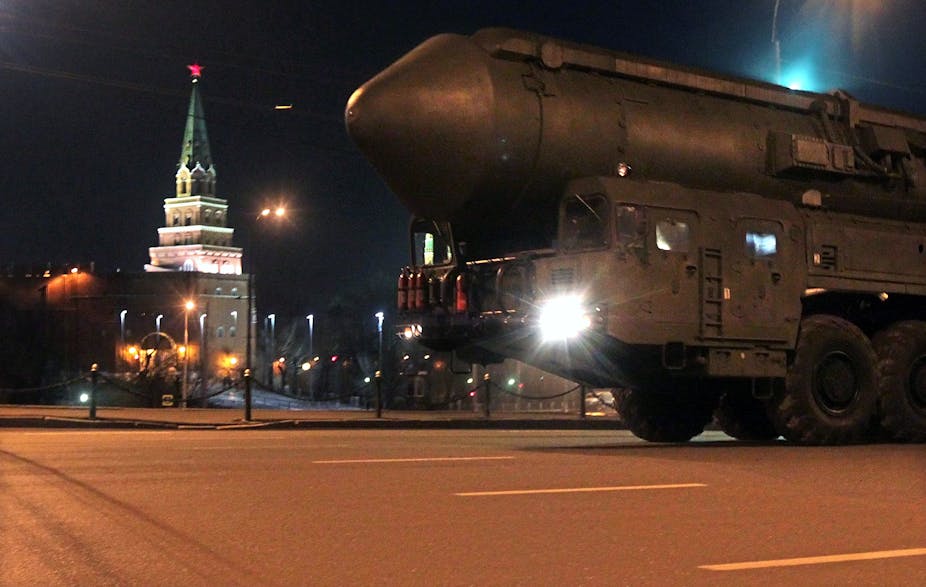Many in the West suddenly seem to think we’re on the road to a new Cold War. Talk of a return to the era of nuclear rivalry swirls around Russia’s muscular and belligerent grandstanding over Ukraine, and the conflict has certainly cut the chances for a new treaty to further reduce nuclear stockpiles.
But the idea that a wholesale breakdown of nuclear arms control is imminent is misguided. It overlooks the specific military and defence-political context in which the current debates occur – and it’s based on a very limited understanding of what arms control is actually for.
In fact, the recent news of escalating fears over nuclear matters could be read as a sign that the norms of arms control diplomacy are holding strong. Instead of being a problem, renewed focus on the problem of arms control may well provide a venue in which to defuse some of this worrying and retrograde East-West tension.
Here we go again
First of all, these worries are not new. Stories about Russian cruise missiles and a possible Russian violation of the Intermediate Range Nuclear Forces (INF) Treaty were in the air almost exactly a year ago; references to it have long been popping up in Russian defence policy documents, most importantly the 2010 military doctrine. President Putin and other Russian politicians have often played the nuclear card in order to assert Russia’s international clout.
In any case, the debate over whether and how to modernise ageing nuclear weapons is not unique to Russia, nor is it purely a fact of the Ukraine conflict. It’s a symptom of the massive shift in the parameters of defence policy and strategic insecurity in many nations after the end of the Cold War.
Many of the US weapons systems have also come of age, and are in the process of redevelopment and renewal. Britons are used to hearing about the renewal and up-dating of the nuclear Trident submarine-based weapons system, whose future has been a staple of the country’s foreign and defence policy debate for decades.
The global financial crisis and recession of the past few years added some extra urgency to all these problems, what with across-the-board budget cuts and the poor state of existing Cold War-era equipment and resources. In the post-crisis austerity era, the question for nuclear-armed states is whether weapons unlikely ever to be used in battle are really a justifiable expense.
Get with it
The right-wing British and American voices clamouring for a more assertive nuclear stance towards Russia have to be heard with that question in mind.
The armed forces of both countries have been left haggling over increasingly scarce resources and funds, and advocates of nuclear defence systems are now faced with stiff competition from those who argue that definitions of security from the Cold War era are dangerously out of date.
Meanwhile, few (if any) Western nations still see national security in principally military terms, as they did for most of the Cold War. They now pay just as much attention to issues of welfare and international development, environmental risks, and cyber-terrorism.
In short, nuclear weapons are just part of a much broader and more complex security landscape – and for many even in the Anglo-American defence establishment, it’s no longer self-evident why nations would still require them.
But behind the current debate about Russia’s potential violations of the INF Treaty and an end to the arms control regime as we know it lurks a fundamental issue: the ever-shifting shape of international politics since the end of Cold War, and the implications for what defence and foreign policy should look like.
Parallel worlds
Russia obviously views the post-Cold War sphere in a very distinctive way. German chancellor Angela Merkel was correct when she argued in early 2014 that Putin lived “in another world”.
He is clearly trying to further Russia’s national interest and to gain domestic political advantage by highlighting his country’s nuclear prowess – and he hopes this will counterweight Russia’s deteriorating performance in the global economy.

We need to be careful not to be drawn into Putin’s world, with its illusions of untrammelled national sovereignty propped up by nuclear weapons. Many Republicans in the United States and Conservatives in the UK are driven by similar “sovereignty panic”, albeit within democratic political systems.
But at the same time, these tactics are nothing new. Nuclear weapons have always been tools for countries to demarcate their sovereignty – and arms control mechanisms have never been purely about numbers of weapons, their type, or seeing out international treaties. They are also processes for creating international norms for conflict resolution more broadly.
Put simply: diplomacy matters.
Stay the course
The norms of negotiation and how to do it held fast, against the odds, across a number of severe international crises during the Cold War. Given this history and the deep institutional knowledge of it in Moscow, London, Washington and elsewhere, it is inconceivable that today’s governments would give up on the process out of mere pique or exhaustion.
And positive efforts continue. The US and its allies on the one hand and Russia on the other continue to engage with Iran to find a solution to nuclear proliferation there, and while the process has been slow, the political will for it to succeed is clearly there on all sides.
Ultimately, Cold War ideas of a “strong nuclear stance” are unhelpful, and don’t reflect the reality. Nuclear arms control is a core part of politics and political negotiation; it has come back into the public domain principally because it still works and still matters, and of that we should be glad.

